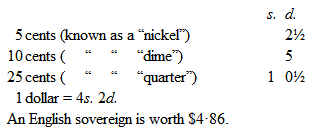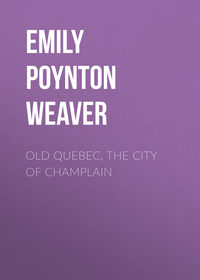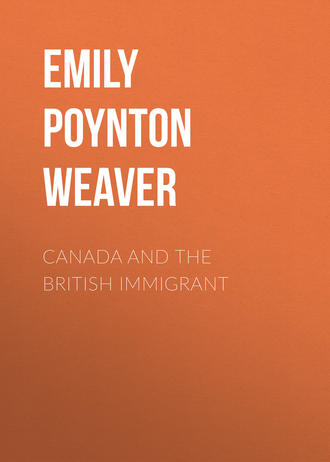 полная версия
полная версияCanada and the British immigrant
The immigration of families consisting of parents and children is still more satisfactory from the Canadian point of view, for this, in ordinary cases, means that the children, brought up under normal conditions, will be assimilating in their early years Canadian customs, methods of work, and habits of thought. This is a process that all immigrants, young or old, must go through to a certain extent, if they are really to “settle” in the country. Speaking broadly, adaptation to new conditions is much more difficult for the young man than for the child, and for the old person than the young, unless in the case of those exceptional people who seem to have discovered the secret of perpetual youth, and are alert, ready to learn, adaptable, and intensely interested in life and their surroundings to old age.
In many instances the process is not only difficult but painful; and I should like to speak a word of encouragement to the immigrant in his first year or two, when the exciting novelty of the change has worn off, and he has not yet become thoroughly acclimatized either to the physical or mental atmosphere of the new country. In some cases he passes through a period of miserable homesickness, when everything seems disappointing. Then, even such minor ills as unfamiliar kinds of implements to work with (for instance, in the case of a woman, stoves in place of the accustomed open fires) seem to add sorely to the hardships of life. I can remember very well the general depression of spirits in our family when we were trying in vain to keep ourselves warm and to cook in bitter wintry weather with green basswood, foisted upon us by our next-door neighbour, who in some other little ways showed himself very ready to “turn an honest (?) penny” out of our inexperience.
But discouragement passes; soon the newcomer learns how to take care of himself, and, looking back, wonders how his “mole-hills” ever came to be such mountains. A good stock of patience and some small sense of humour ought to make part of the equipment of every immigrant, for there is nothing like the power of seeing the funny side of things to help one over the minor trials of life, and it is good not to take oneself too seriously.
Nevertheless, an immigrant should not make himself unnecessarily funny in the eyes of others. For example, unless the young Englishman is bound for the backwoods, it really is not necessary for him to attire himself in the strange and shaggy garments which the town-bred English tailor thinks appropriate for “the colonies.” In most towns and settled country districts he will need much the same kind of clothing as he would use in such places in England. Often, during the first winter, the Englishman does not feel the need of much warmer clothing than he was accustomed to wear at home; but he should have a good heavy overcoat, and, if he is bound for the West, a fur coat or one lined with sheepskin will be a great comfort. He should also have a warm cap which he can pull down over his ears when driving, for the ears are peculiarly liable to get frost-bitten, and one or two stout pairs of woollen or warmly-lined leather gloves will be found useful, for here men do not work in the winter months with uncovered hands, except perhaps west of the Rocky Mountains. In the case of a family, every member of it, from the father to the little tots, should be provided with woollen gloves or mittens, warm caps or hoods, and warm underclothing. All these things, and some wraps and rugs in addition, may prove very useful on the voyage at any time of year; and they will usually be needed on the first arrival in Canada, for most immigrants come in the early spring, when the weather is still cold.
Ordinarily, the trains are sufficiently heated, but there is often a good deal of waiting at wharves or stations. There may be a long drive from the railway to the final destination, and it is best to be well provided for such contingencies. Soon after the arrival of the spring immigrant, however, cool, light clothing for the hot months of the Canadian summer will be required, and it is well for a woman to bring, if possible, some supply of cotton blouses and dresses. The woven, porous kind of cotton underclothing is cheap and suitable for the climate. In their first year, Englishwomen often make the mistake of overloading themselves and their children with heavy garments. I remember, on a hot July day, seeing a poor little English year-old baby swathed in one layer of flannel above another, with the perspiration running down its face, while its sisters, old enough, I suppose, to rebel at such treatment, looked comparatively cool and comfortable in light cotton dresses.
Upon the whole, clothing is dearer in Canada than in England, but the extra cost of the various articles is in a measure neutralized by the fact that a cheaper class of goods—that is, cotton and muslin—can be worn, at least in the inland parts, for a longer period in the year. If possible, it is well to bring out a good supply of boots and shoes and clothing, but not too many of such outer garments, which a change of fashion may render conspicuously out-of-date within a year or two, for Canadians of all classes pay a good deal of attention to dress.
It is good to bring some blankets, and wadded quilts and table-linen, which are all more expensive in Canada than in the “Old Country.” On the other hand, it is not well for the newcomer of little capital to put too much of his small stock of money into such provision for the future, for often the articles bought far in advance do not seem quite what would be bought after some experience in the new home; and it is most desirable to keep a few pounds—or dollars—on hand against a possible emergency.
In fact, the government requires that every adult immigrant—except farm labourers and domestic servants—should have some money in his or her possession when landing (See Appendix, Note C, pg. 298); and half as much is required for children under eighteen. This rule is strictly kept, and during the last ten years no less than 1,471 immigrants (of course, by no means all British) were sent back on their arrival on account of lack of funds; and a considerable number of British and other immigrants are not allowed to land, or are deported within two years, on account of insanity, tuberculosis, or other diseases of mind or body. Others have been rejected on account of criminality or bad character; or because there was reason to believe that they would be, or had actually become, public charges.
With regard to the question of admittance, it is most desirable that anyone thinking of coming to Canada, and having a suspicion of some defect or disease in himself or any member of his family, should be very careful to make sure before starting whether or not he and the rest of his party would be admitted. In case of doubt, he would be wise to write to the Assistant Superintendent of Emigration, 11 and 12, Charing Cross, London, giving full particulars, for it is worse than useless for anyone to have the trouble and expenses of the sea voyage only to be sent back. It is much better not to start at all.
For information concerning the cost of passage, the amount of baggage allowed, and so forth. (See Appendix, Notes D, pg. 299 and E, pg. 300.)
Where distances are so great as in Canada, it is often necessary for the immigrants to pass several nights on the train. There are three classes of sleeping cars in use on the Canadian railways. In the “colonist sleeping cars,” which are free to second-class passengers on the Canadian lines, berths are provided, but they are not upholstered, and the occupants may use such bedding and rugs as they have with them, or the whole outfit of mattress, pillow, blanket, and a pair of curtains can be purchased for the sum of $2·90 (about 12s.), or the separate articles in proportion.
When it can be afforded, however, the immigrant would be wise to pay the additional price for a berth in a “tourist sleeper” (which is about half that of the “standard sleepers”). In the tourist cars the accommodation is excellent, bedding is provided, and each car has its attendant porter. The travellers in these cars may either take their meals on the dining-car (when there is one on the train, and when the question of minor expense is not a very important one), or may carry their food with them, making tea for themselves, heating food for a baby, etc., in a little kitchen at the end of the car. These cars are much used, for the sake of convenience, by persons travelling with children who could well afford to travel in the first-class sleepers.
Before buying tickets for Canada, however, the intending emigrant might do well to write to Commissioner D. C. Lamb, of the Salvation Army, which makes arrangements for emigrants (of whom it is said less than 20 per cent. belong to the Army) to obtain tickets from England to certain points in Canada, “including the cost of bed and food on rail.” (See Appendix, Note D, pg. 299.) The Army also arranges for “reserved carriages and special rail accommodation, chiefly for women,” who “are accompanied by experienced conductresses from the beginning to the end of their journey.” (See Appendix, Note F, pg. 301.)
We will now suppose our British immigrant to have reached his destination, in East or West or Central Canada; and our final word to him, perhaps, should be not to be in too much hurry to commit himself to some irrevocable step. If he has capital, it is often wise for him to let it lie for a little while at interest while he gets to know the country, possibly working on wages for someone else. If the newcomer has little money, then it is best to accept for a time almost any honest work that offers, especially work in which something may be learnt of the country; and to change to something more desirable when the chance comes—as it will come—to the alert and thrifty and industrious. For, after all, the newcomer must learn for himself the things he most needs to know. Many of these things cannot be put into a book, for books must deal largely with generalities, while each immigrant brings his own idiosyncrasies to the problem of fitting into a peculiar environment.
Finally, it is good that the newcomer should realize and remember that “immigration” has two sides to it—that the new country deserves consideration as well as the new arrival, and that this “land of opportunities” only yields its best to the man or woman prepared to give as well as to get.
APPENDIX
NOTE A.
List of Dominion and Provincial Officials who will give Information about Canada
Dominion AgentsEngland:
Mr. J. Obed Smith, Assistant Superintendent of Emigration, 11-12, Charing Cross, London, S.W.
Mr. A. F. Jury, 48, Lord Street, Liverpool.
Canadian Government Agent, 139, Corporation Street, Birmingham.
Canadian Government Agent, 81, Queen Street, Exeter.
Mr. L. Burnett, 16, Parliament Street, York.
Scotland:
Mr. J. K. Miller, 107, Hope Street, Glasgow.
Mr. G. G. Archibald, 26, Guild Street, Aberdeen.
Ireland:
Mr. John Webster, 17-19, Victoria Street, Belfast.
Mr. Edward O’Kelly, 44, Dawson Street, Dublin.
Provincial AgentsFor Nova Scotia:
Mr. John Howard, Agent-General for Nova Scotia, 57a, Pall Mall, London, S.W., will also furnish information respecting the province.
When a person arrives in Nova Scotia and wishes to secure farm work, he should apply at once to the Dominion Immigration Agent in Halifax, or to Mr. Arthur S. Barnstead, the Secretary of Industries and Immigration for the province, 197, Hollis Street, Halifax.
For New Brunswick:
Call on or write to Mr. A. Bowder, New Brunswick Representative, 37, Southampton Street, London, W.C.; or to Mr. Jas. Gilchrist, Superintendent of Immigration, 4, Church Street, St. John, N.B., Canada.
For Prince Edward Island:
Apply to J. E. B. McCready, Publicity Agent, Charlottetown, Prince Edward Island.
For Quebec:
Apply personally or by letter to—Hon. Dr. Pelletier, Agent-General of the Province of Quebec, 36, Kingsway, London, England.
The Department of Colonization, Mines and Fisheries, Quebec, Canada.
Captain Labelle, Immigration Buildings, Quebec, Canada.
Mr. Emile Marquette, 82, St. Antoine Street, Montreal, Canada.
Mr. J. A. Cook, Secretary, Eastern Townships Associated Boards of Trade, Sherbrooke, Quebec.
For Ontario:
Apply to—N. B. Colcock, Ontario Government Agent, 163, Strand, London, England.
H. A. Macdonell, Director of Colonization, Parliament Buildings, Toronto, Ontario, Canada.
For Manitoba:
J. Bruce Walker, Commissioner of Immigration, Winnipeg, Manitoba.
For Saskatchewan:
Information may be obtained by writing to the Hon. W. R. Motherwell, Minister of Agriculture, Regina, Saskatchewan.
For Alberta:
Address all inquiries to Chief Publicity Commissioner, Department of Agriculture, Edmonton, Alberta.
For British Columbia:
Address Hon. J. H. Turner, Agent-General for British Columbia, Salisbury House, Finsbury Circus, London, England; or the Bureau of Provincial Information, Victoria, B.C.
No fees are charged by Government Agents.
NOTE B.
Synopsis of Dominion Land Regulations
Any male over eighteen years old, or a widow who is the sole head of a family, may homestead a quarter-section (one hundred and sixty acres) of available Dominion land in Manitoba, Saskatchewan or Alberta. The applicant must appear in person at the Dominion lands agency or sub-agency for the district. Entry by proxy may be made at any agency on certain conditions by father, mother, son, daughter, brother or sister of intending homesteader.
Duties.—Six months’ residence upon and cultivation of at least thirty acres of the land, a proportion of which has to be done in each of three years. A homesteader may live within nine miles of his homestead on a farm of at least eighty acres solely owned and occupied by him or by his father, mother, son, daughter, brother or sister. The erection on the homestead of a house worth $300 (£60).
In certain districts a homesteader in good standing may pre-empt a quarter section alongside his homestead. Price $3 (12s. 6d.) per acre.
Duties.—Must reside six months in each of six years from date of homestead entry (including the time required to earn homestead patent) and cultivate fifty acres extra. The erection on the homestead or pre-emption of a house worth $300 (£60).
A homesteader who has exhausted his homestead right and cannot obtain a pre-emption may take a purchased homestead in certain districts. Price $3 (12s. 6d.) per acre.
Duties.—Must reside six months in each of three years, cultivate fifty acres and erect a house worth $300 (£60).
Newly-arrived immigrants will receive at any Dominion lands office in Manitoba, Saskatchewan or Alberta, information as to the lands that are open for entry in that district, and from the officers in charge, free of expense, advice and assistance in securing lands to suit them. Full information respecting the land, timber, coal and mineral laws may be obtained on application to the Superintendent of Immigration, Department of the Interior, Ottawa; or the Commissioner of Immigration, Winnipeg, Manitoba. Dominion land agents can furnish information regarding land in their respective districts only.
NOTE C.
Requirements as to Money Immigrants must have in Possession on Landing
Between November 1 and February 28, the Canadian Government requires that adult passengers shall have at least $50 (£10) in their possession at time of landing, and $25 (£5) for each person under eighteen, together with necessary transportation, or money equal to cost of transportation, to their destination in Canada. Between March 1 and October 30 the money requirement is $25 (£5) and $12·50 (£2 10s.). Exceptions to this are persons going as farm labourers and domestic servants who can prove to Immigration Authorities that they have assured employment. They must also be provided with means to reach destination. Also immigrants, whether male or female, going to reside with a relative who is able and willing to support such immigrant, providing immigrant has the means of reaching the place of residence of such relative:—
1. Wife going to husband.
2. Child going to parent.
3. Brother or sister going to brother.
4. Minor going to married or independent sister.
5. Parent going to son or daughter.
NOTE D
Cost of Passage and Baggage Allowance
There are no assisted passages except, in some provinces, loans by Government to domestic servants. The steamship fares are: Second class, from £8 to £12; children from one year to twelve years, half fare; infants under twelve months, £1. Third class, £5 to £10; children from one year to twelve years, half fare; infants under twelve months, 10s. The fare by rail charged to newcomers is one penny a mile.
Colonists are allowed free on ocean steamers twenty cubic feet of baggage for second cabin, and ten cubic feet third-class. On railways in Canada and the States one hundred and fifty pounds for each adult, and seventy-five pounds for each child’s half-fare ticket are carried free, but this applies only to personal effects. No single piece of baggage of over two hundred and fifty pounds will be carried on passenger trains, but must be sent by goods train. This must be done also, at additional charge, in the case of all goods not wearing apparel or personal effects.
If free baggage allowance as above is exceeded, the extra charge on steamship will be 9d. per cubic foot, second cabin; and 6d. per cubic foot, third-class. On the railways the extra charge will be 12 per cent. of the colonist fare for each one hundred pounds or part thereof.
Salvation Army Tickets Covering Cost of Bed and Food on Rail at Inclusive Rates
To Vancouver, for British Columbia, £17 15s.; to Calgary, £15; to Medicine Hat, £14 10s.; to Regina, £13 10s.; to Winnipeg, for Manitoba, Alberta, and Saskatchewan, £12 5s.; to Toronto, for Ontario (10s. less from Southampton), £9 5s. The figures quoted cover third-class accommodation on the ocean and colonist railway car in Canada. Passengers travelling second-class on the ship can add the extra.
For particulars apply to Commissioner D. C. Lamb, 122, Queen Victoria Street, London, E.C.; or any of the following branch offices: 170A, London Road, Liverpool; 5, Denmark Street, Bristol; 74, Cobourg Street, Plymouth; 203, Hope Street, Glasgow; and 222, Albert Bridge Road, Belfast.
The Army also has a fully-equipped department for dealing with first and second-class business. Address: 122, Queen Victoria Street, London, E.C.
NOTE E.
“Settlers’ Effects Duty Free.”
The following is an extract from the Customs tariff of Canada, specifying the articles which can be entered by settlers free of duty:
Item 455. Settlers’ Effects, viz.:—Wearing apparel, books, usual and reasonable household furniture and other household effects; instruments and tools of trade, occupation or employment, guns, musical instruments, domestic sewing machines, typewriters, bicycles, carts, waggons and other highway vehicles, agricultural implements, and live stock for the farm, not to include live stock or articles for sale, or for use as a contractor’s outfit, nor vehicles nor implements moved by mechanical power, nor machinery for use in any manufacturing establishment; all the foregoing if actually owned abroad by the settler for at least six months before his removal to Canada and subject to regulations by the Minister of Customs: Provided that any dutiable articles entered as settlers’ effects may not be so entered unless brought by the settler on his first arrival, and shall not be sold or otherwise disposed of without payment of duty until after twelve months’ actual use in Canada.
The settler will be required to fill up a form (which will be supplied to him by the Customs officer on application) giving description, value, etc., of the goods and articles he wishes to be allowed to bring in free of duty.
NOTE F.
Young Women’s Christian Associations Directory, etc
Directory of the Young Women’s Christian Associations of CanadaOntario:
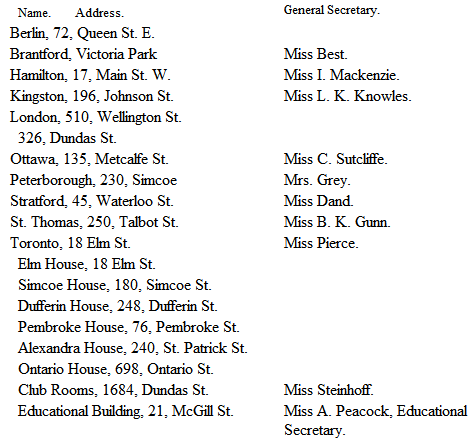
Quebec:
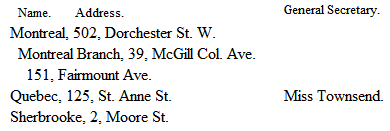
Nova Scotia:

Manitoba:
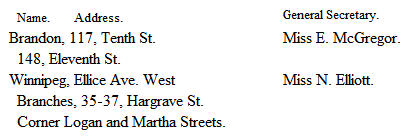
Saskatchewan:
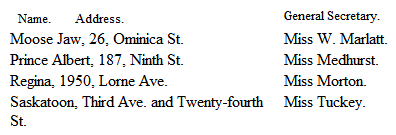
Alberta:

British Columbia:

A Secretary will meet all steamers at Quebec, and will be glad to render assistance to those arriving.
In many of the large city depôts there is a Traveller’s Aid Secretary, whom it is wise to consult if desirous of any information.
Young women coming as strangers are urged not to seek advice from any but uniformed officers, deaconesses and Traveller’s Aid Secretaries.
The Young Women’s Christian Association is a recognised centre where any young woman may go for advice.
Salvation Army Hostels for Women-Immigrants.—Cathcart Lodge, 24, Cathcart Street, Montreal; Rosedale Lodge, 916, Yonge Street, Toronto; Balmoral Lodge, Mountain Avenue, Winnipeg; and Pleasant Lodge, 75, Seventh Avenue East, Vancouver.
Women DomesticsThe Salvation Army Emigration Department undertakes:
1. To advance, if necessary, by way of loan, part of the passage money to approved domestic servants.
2. To give free and disinterested advice as to the best locality in which to settle and the best time to go.
3. To safely take parties of girls to Canada under the care of experienced conductors.
4. To have parties of girls met by our own officers on arrival in Canada, conducted through the Customs and to the trains, and thence to their destinations.
5. To guarantee employment before leaving England to all domestic servants emigrating to Canada under our auspices.
6. To accommodate girls in one of our four Hostels in Canada, should it be necessary to wait a day or two before going to their situations.
British Welcome League (for Men, Women and Children), 4 Spadina Avenue, Toronto.
Young Men’s Christian Association (Dominion Headquarters),15, Toronto Street, Toronto.
Imperial Home Reunion AssociationWinnipeg Offices: The Winnipeg Industrial Bureau, Main and Water Streets (’Phone M 1,000). (Interest at the rate of 6 per cent. per annum charged on all loans.) Branches at Winnipeg, Toronto, Montreal, Vancouver, Edmonton, Calgary, Hamilton, Brandon, Ottawa, Regina, Red Deer, Moose Jaw, Yorkton, St. John, Medicine Hat, Halifax, Nelson, Gait, Weyburn, Dauphin, Victoria, Fort William, Lethbridge, London, Peterborough.
NOTE G.
British Equivalent of Canadian Money
